Engender blog
Engender launches report on women’s experience of the election process
Today, Engender has launched a new report: Women’s political journey: Exploring the election process and women’s experiences of abuse, exclusion and bias, including vital recommendations for improvement. Find out more about the report below.
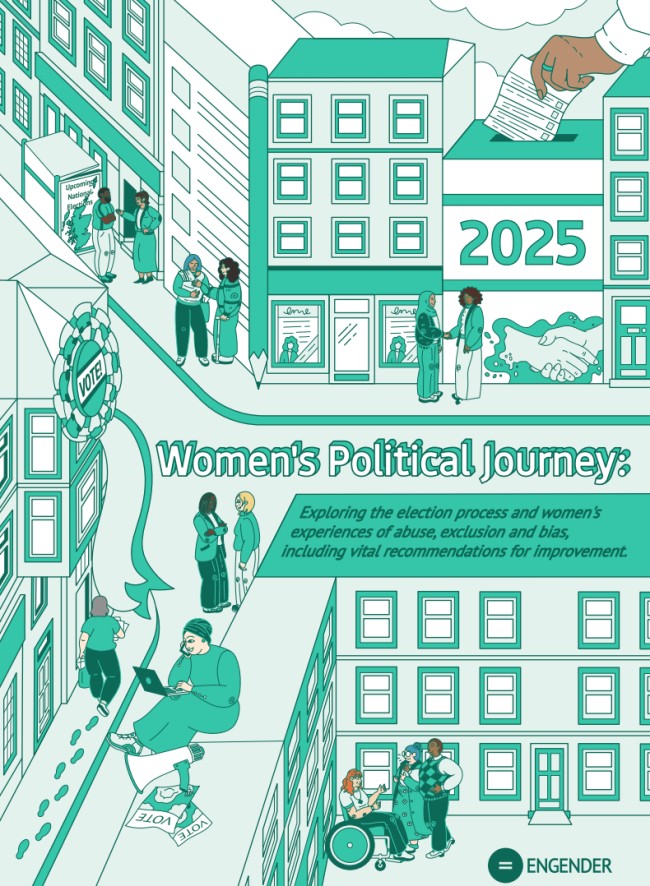
“Someone said to me [during the election] and I quote, ‘we can’t win here with someone who looks like her.”
The political arena is becoming increasingly hostile, especially for women and marginalised women.  Engender’s new report ‘Women’s Political Journey’ explores the candidate journey—from preparing to stand as a candidate, including all the interview and vetting processes, to being elected and what happens after.
Engender’s new report ‘Women’s Political Journey’ explores the candidate journey—from preparing to stand as a candidate, including all the interview and vetting processes, to being elected and what happens after.
There is still an image of the ideal candidate as white, middle-class, able-bodied, and male. For anyone who falls outside these categories, this means being prepared for additional barriers.
Our report shows that over 70% of respondents to a question on forms of abuse reported experiencing online harassment or trolling during their campaign. Only 11% felt “very safe” during their campaign period.
A survey respondent told us:
“I have been spat on, shouted at, abused and physically shoved countless times.”
Sexist bullying is a persistent problem within some branches and local parties, with findings indicating that disabled and minoritised women may be at increased risk. These experiences can cause women to question their positions and political futures. It is widely recognised that social media presents significant risks for women in politics, with Black and minority ethnic women at greatest risk.
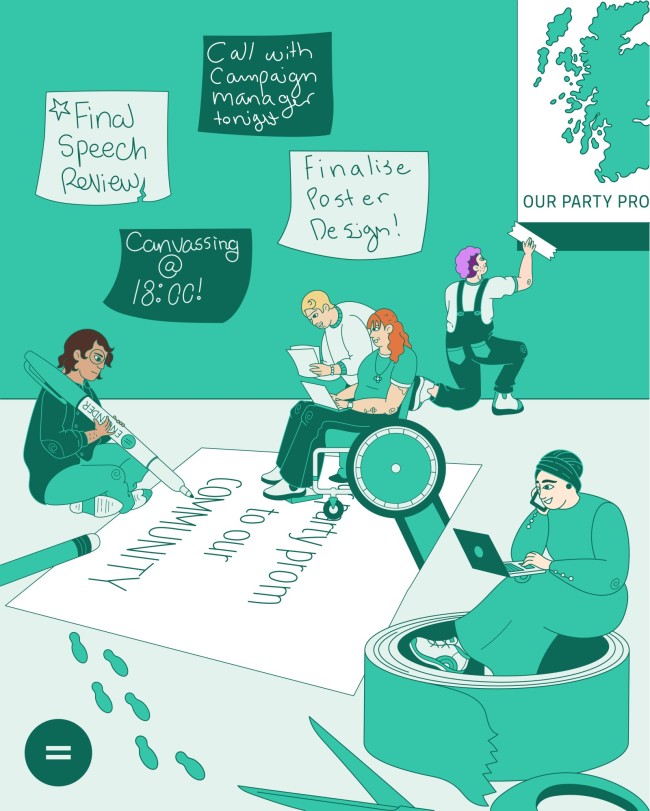
57% of our survey respondents felt that positive action measures (PAMs) like quotas or all-women shortlists are ‘resented’ by some party members who feel their use is unfair or unnecessary. As has been reported to us, white men especially refuse to make space for other groups if it means sharing their privilege. Others reported only tokenistic acceptance of PAMs, reducing the ultimate impact of measures.
Very few parties are consistently collecting equalities monitoring information on prospective candidates. This is vital when it comes to ensuring candidate diversity and proportionate representation of Scotland’s communities.
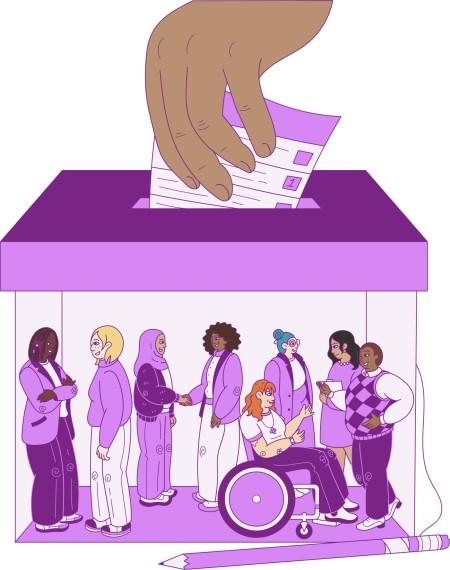 Equal Representation Development Officer Noomi Anyanwu states:
Equal Representation Development Officer Noomi Anyanwu states:
“Abuse, lack of support, and biases were reported widely among our survey participants and interviewees. Nearly 30% would not recommend candidacy to underrepresented groups. It’s understandable considering what women must endure to make it as politicians, but we don’t want to settle for this.”
“Change needs to happen, so we urge political parties, governments, councils, and other stakeholders to implement measures and commit to equal and diverse representation. I want to see at least 50% women in our parliaments—for that to happen, we need to see a real culture change first.”
Read the full report including vital recommendations for action here.
Joining Up Policymaking to Prevent Violence Against Women and Girls

At Engender, one of our areas of focus is preventing violence against women and girls (VAWG) before it gets the chance to occur. This approach, known as primary prevention, focuses on tackling the root cause of violence, gender inequality, by embedding gender-sensitive thinking into every area of public policy.
Through our Delivering Equally Safe project, we explore how different areas of public policy can prevent violence from occurring. We believe that to truly move the needle on VAWG, we need more than good intentions. We need policy professionals across sectors to work together. That’s why, in 2024, we brought over 50 policy professionals from 30 different organisations together for our first Primary Prevention and Policymaking Conference.
Our first conference showed just how vital cross-sector collaboration amongst policy professionals is to embedding primary prevention. Fast forward one year, and we were delighted to be joined by policy professionals from across Scotland in Glasgow in March to reflect, share the findings of our recent research, and look ahead. It was a chance to share knowledge, build relationships, and spark real momentum.
 Where We Are a Year On...
Where We Are a Year On...
At this year’s event, Hannah Brisbane, our Delivering Eqaully Safe Policy Officer, kicked things off with a deep dive into the Delivering Equally Safe (DES) project. Her presentation unpacked what some of the key components of a primary prevention approach in policymaking, including:
- Equal representation across all levels
- Intersectional gender analysis
- Designing policies that actively promote women’s safety
Hannah also shared reflections from the previous year’s conference, noting that attendees had expressed a sense of pride in Scotland’s world-leading approach to addressing VAWG but were frustrated that budgets and capacity did not match the scale of the challenge we face.
Good Practice and Missed Opportunities
Following last year’s conference, we commissioned research to find out more about local primary prevention approaches in Scotland, and we’re delighted to share the report produced by independent research consultant Kathryn Ramsay with you now.
The report highlights several structural barriers to primary prevention work across local areas, including:
- a lack of authority for VAWPs,
- a lack of funding and resources for existing work and
- insufficient priority given to prevention work by leaders. Kathryn also shared other challenges beyond these, including
- the poor implementation of the Public Sector Equality Duty (PSED), the
- lack of reliable measures of progress with prevention and
- the use of potentially confusing terms and jargon
In Kathryn’s research, numerous interviewees highlighted existing Equally Safe programmes (Equally Safe at School, Equally Safe at Work, and Equally Safe in Practice) as good practice happening locally on primary prevention. These initiatives are real-world examples of how prevention can be embedded into different areas, and it’s interesting to note that these good practice examples were designed and delivered by women’s sector organisations.
Reflections
We asked attendees at this year’s conference to reflect on what enables them to take a primary prevention approach, and what gets in the way. Not surprisingly, funding and capacity came up as one of the most common barriers to implementing primary prevention. However, many attendees also noted the potential for funding and capacity to be vital enablers when provided adequately and sustainably.
Other key enablers included:
- Gender expertise and competence
- Intersectional thinking
- Networks like the the National Violence Against Women Network, the Authentic Voices Network and the Safer, Sooner Domestic Abuse network
It’s clear to us that there is a strong appetite for cross-sector collaboration, and that people want to work together to build policies that prevent violence before it starts. While opportunities exist to facilitate this collaboration, Kathryn’s research shows that some of these are not reaching their full potential.
 What’s Next?
What’s Next?
We’ll be using the findings from Kathryn’s report and from the sessions throughout this year’s conference to push for meaningful change in relation to the implementation of primary prevention in Scotland. We’ve created a conference report that explores what was shared in workshop sessions on gender mainstreaming, VAW in politics and public life, a public health approach to preventing VAWG, and applying a primary prevention lens to public policy.
Read the conference report here.
Read Kathryn’s research report here.
Broken and biased: new report shows impact of housing emergency on women
A new report published today by Shelter Scotland and Engender shines a light on the disproportionate impact of the housing emergency on women, and the additional barriers they face in accessing safe, secure, affordable, housing.
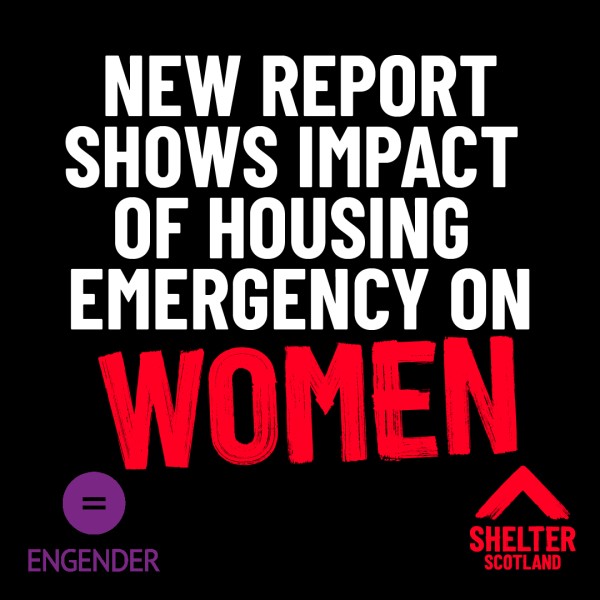
The report, released on Challenge Poverty Week’s Housing Day, shows that the higher rates of poverty among women and their greater reliance on social security benefits restricts their access to housing, with barriers being particularly pronounced for minoritised women.
It also sets out that homelessness services in Scotland are often unequipped to respond to women’s specific needs, particularly those fleeing domestic abuse. Women’s caring responsibilities and concerns over safety also create additional requirements for the type of temporary homeless accommodation that they need to access, which local services too often fail to meet.
Calling for action to address the housing emergency from a gendered perspective, the report makes a series of recommendations, including:
- Improve women’s access to safe, secure, and affordable homes by increasing the supply of social housing.
- Changes to social security to tackle women’s economic inequality, including the establishment of a ‘fund to leave’ for women experiencing domestic abuse.
- Adopting a gendered approach to the allocation and supply of temporary accommodation, taking particular account of women’s needs with regards to gender-based violence and childcare responsibilities.
- Investment in research and improved data collection to ensure women’s homelessness, including those with no recourse to public funds, is better understood and not ‘hidden’ from official monitoring.
The report argues that decades of underinvestment in social homes combined with years of austerity has created a housing system which is not only broken but biased as well.
Shelter Scotland Director, Alison Watson, said:
“This report sets out in the clearest terms the specific and disproportionate harm done to women by the housing emergency.
“Following on from the devastating homelessness figures published recently, the report is a timely reminder that Scotland’s housing system is not only utterly broken, but also biased as well.
“We know that when it comes to housing councils are breaking the law on an industrial scale, denying support to those who need it and are entitled to it; for a woman fleeing domestic violence the consequences of being turned away could be utterly catastrophic.
“Childcaring responsibilities are also far more likely to fall to women, so growing child homelessness will of course have a hugely disproportionate impact on women in Scotland.
“Scotland’s housing emergency is devastating the lives of women every day; every level of government has a responsibility to act and to heed the recommendations in this report.”
Engender’s Executive Director, Catherine Murphy, said:
“Our report with Shelter Scotland demonstrates the multiple barriers that our current housing system stacks in front of women, and the shocking ways it ignores their specific needs, pushing women into cycles of poverty and instability.
“The situation is even worse for women dealing with multiple layers of inequality. BME, disabled, and refugee women, lone parents, and those with caring responsibilities, often face relentless difficulty in securing stable housing.
“The official homelessness statistics tell us only a fraction of the story, as they fail to capture the complexity of women’s experiences, leaving them ‘hidden’ from our understanding of the problem.
“The recent pilot fund for women experiencing domestic abuse is a positive step, but it barely scratches the surface of what’s needed to address the housing emergency women face.
“Any serious response to Scotland’s housing crisis must start with acknowledging the deep gender bias in the system and taking targeted action to improve women’s access to safe, secure, and affordable homes.”
You can read the full report here, and come along to our joint webinar on 31st October to find out more about the action required to address the housing emergency from a gendered perspective. Book your free place here.
8 Steps Towards Women’s Equality in Scotland
Ahead of the next Programme for Government for 2024-25, we have outlined several important actions we want the Scottish Government to take to protect women’s rights and promote gender equality in Scotland.

Engender advocates for a Scotland where women are involved in all political and economic decisions, both as decision-makers and individuals affected by these decisions. This means recognising the diverse experiences of all women, including those facing multiple forms of discrimination, such as Black and minority ethnic women, younger and older women, disabled women, lesbian, bisexual, and trans women, women from rural areas, and those who are mothers, women who have experienced domestic abuse or men’s violence, and those experiencing poverty.
We have identified eight key actions in three main areas that need change:
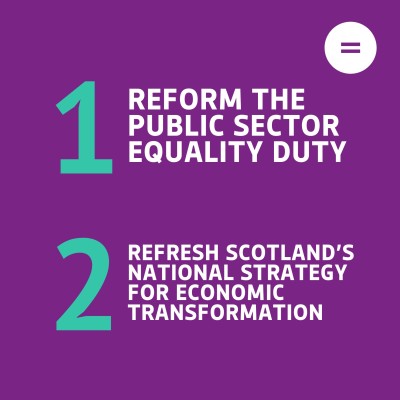 EMBED GENDER EQUALITY ACROSS ALL SCOTTISH GOVERNMENT POLICY
EMBED GENDER EQUALITY ACROSS ALL SCOTTISH GOVERNMENT POLICY
To achieve the Scottish Government’s main goals—eliminating child poverty, boosting the economy, addressing climate change, and improving public services—it’s crucial to improve how gender equality is considered across policymaking. These goals affect women and men differently, especially for women facing additional marginalisation. If policies don’t account for structural inequalities, their benefits for Scotland’s most disadvantaged people will be limited.
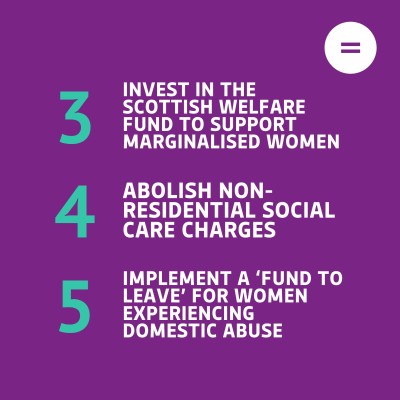 ADDRESS WOMEN’S POVERTY AND FINANCIAL INEQUALITY
ADDRESS WOMEN’S POVERTY AND FINANCIAL INEQUALITY
Eliminating child poverty is the First Minister’s top priority. To succeed, the Programme for Government must connect women’s poverty with children’s poverty. There’s an urgent need to get financial support to the most vulnerable families in Scotland, and focusing on women’s economic inequality is often the most effective approach. This must include targeted actions which tackle the disproportionately negative impacts that the cost of living crisis is having on women’s lives, especially for women who experience other forms of marginalisation.
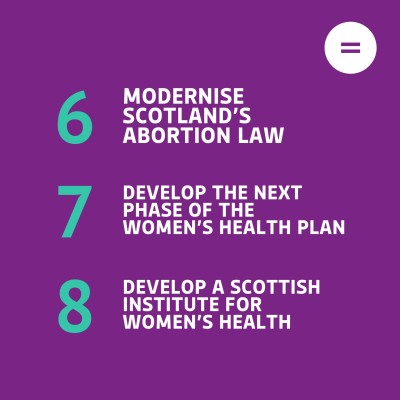 TACKLE WOMEN’S HEALTH INEQUALITIES AND PROTECT REPRODUCTIVE RIGHTS
TACKLE WOMEN’S HEALTH INEQUALITIES AND PROTECT REPRODUCTIVE RIGHTS
Women and girls still face inequalities in health and wellbeing and access to services compared to men and boys, mainly due to gender inequality and “medical misogyny.” Marginalised women, including women of colour, disabled women, unpaid carers, LGBTI+ women, younger and older women, and migrant women, experience even wider disparities in health outcomes. We urgently need updated abortion laws that uphold women’s rights and action to advance Scotland’s Women’s Health Plan.
Read more about all our asks here.
General Election 2024 - The Rwanda Scheme & Safety of Women – Joint Blog with Amina MWRC
[Content Note: abuse, sexual assault]
In this joint blog, women’s rights experts from Amina MWRC and Engender come together to discuss the safety of women in light of the Rwanda Act.
We are calling on candidates in the upcoming General Election to commit to taking action on four key areas for women if elected. In our What’s in it for women? four-part series, we’ll break down each of our key asks covering health, social security, equal representation and immigration.
Find and email your local candidates with our pre-written letter here.
.png)
Downloads
 Engender Briefing: Pension Credit Entitlement Changes
From 15 May 2019, new changes will be introduced which will require couples where one partner has reached state pension age and one has not (‘mixed age couples’) to claim universal credit (UC) instead of Pension Credit.
Engender Briefing: Pension Credit Entitlement Changes
From 15 May 2019, new changes will be introduced which will require couples where one partner has reached state pension age and one has not (‘mixed age couples’) to claim universal credit (UC) instead of Pension Credit.
 Engender Parliamentary Briefing: Condemnation of Misogyny, Racism, Harassment and Sexism
Engender welcomes this Scottish Parliament Debate on Condemnation of Misogyny, Racism, Harassment and Sexism and the opportunity to raise awareness of the ways in which women in Scotland’s inequality contributes to gender-based violence.
Engender Parliamentary Briefing: Condemnation of Misogyny, Racism, Harassment and Sexism
Engender welcomes this Scottish Parliament Debate on Condemnation of Misogyny, Racism, Harassment and Sexism and the opportunity to raise awareness of the ways in which women in Scotland’s inequality contributes to gender-based violence.
 Gender Matters in Social Security: Individual Payments of Universal Credit
A paper calling on the Scottish Government to automatically split payments of Universal Credit between couples, once this power is devolved to the Scottish Parliament.
Gender Matters in Social Security: Individual Payments of Universal Credit
A paper calling on the Scottish Government to automatically split payments of Universal Credit between couples, once this power is devolved to the Scottish Parliament.
 Gender Matters Manifesto: Twenty for 2016
This manifesto sets out measures that, with political will, can be taken over the next parliamentary term in pursuit of these goals.
Gender Matters Manifesto: Twenty for 2016
This manifesto sets out measures that, with political will, can be taken over the next parliamentary term in pursuit of these goals.
 Scottish NGO Briefing for UN Special Rapporteur on Violence Against Women
Joint briefing paper for the UN Rapporteur on Violence Against Women.
Scottish NGO Briefing for UN Special Rapporteur on Violence Against Women
Joint briefing paper for the UN Rapporteur on Violence Against Women.

Newsletter
Sign up to receive our newsletter here:
Sign up to our mailing list
Receive key feminist updates direct to your inbox:
